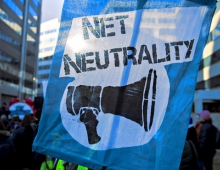
Internet TV Becomes a Reality
Phone companies Verizon and SBC as well as Japanese Nippon Television Network are pushing to deliver TV content over the Internet, and plan to roll out systems later this year.
The companies are pushing to deliver television programs over an internet
platform, a movement that is expected to increase the competition between
broadcasters and offer more program choices.
Major regional US phone companies SBC Communications and Verizon, plan to roll out their first systems later this year in the US market.
BellSouth, another major phone carrier, is also testing Internet protocol television (IPTV), and trials are underway in Britain, Switzerland and elsewhere.
The technology is more like a "video on demand" concept. Internet television would give viewers access to virtually unlimited channels and programs, by offering access to content stored on servers. The advantage of the video on demand internet technology over the multicasting technology, is that the utilization of the available cable bandwidth is better.
The IPTV technology would also make the TV set and computer interchangeable and will allow consumers to schedule or record programs via other devices, such as cellphones.
While cable companies are constrained by the size of their pipe, we have virtually unlimited content potential," said SBC spokesman Larry Solomon.
Globally, about 15 million households will have IPTV services by the end of 2007, up from the current level of 600,000 homes, according to a report from the consulting firm Research and Markets. Global revenues from the sector will exceed US$7.5 billion in 2007.
SBC and Verizon plan to launch their first pilot program late this year in the regions where they are the dominant phone providers, with wider rollout expected in 2006. BellSouth has only announced it is testing the Microsoft IPTV platform.
It is unavoidable that the internet TV service will be competitive with current cable TV. Its major advantage, however, would be its rate-free character, as opposed to current cable TV services offered.
Verizon, meanwhile, is pitching its service as closer to the current type of cable TV offering, with additional capabilities, and also sees potential in a "bundle" of telecommunications services, giving customers a choice of phone, video and Internet.
"When we go to market, we'll be offering a digital broadband TV service, which will mean hundreds of channels and include video on demand," said Verizon spokeswoman Sharon Cohen-Hagar.
"In addition to the channels you would expect to see, there will be a lot of channels that speak to specific interests, perhaps for certain ethnic groups. Everyone will have video on demand, and it will be easy to navigate."
Yankee Group's analyst Adi Kishore said phone companies are pushing for this because their traditional services like phone and Internet are now open to competition.
"They realize they are taking a beating on the broadband side and they need to make investment in video, because there are no other substantial growth opportunities," he said.
The telecom firms, however, face considerable regulatory hurdles, including the daunting task of getting approval in thousands of municipalities. But they are pressing for measures to get statewide or nationwide approval to deliver the service.
Nippon TV to start Web broadcasting in Japan
Japan's major TV network, Nippon Television Network Corp. , will also start distributing programmes on a paid Web site in October, aiming for annual sales of 10 billion yen (US$90 million) within three years.
According to the Japanese Nihon Keizai newspaper, NTV plans to offer more than 10,000 programmes, including dramas and variety shows, on the members-only site, charging a flat fee of 100 yen for each programme.
The network aims to attract 10,000 members within a year.
Major regional US phone companies SBC Communications and Verizon, plan to roll out their first systems later this year in the US market.
BellSouth, another major phone carrier, is also testing Internet protocol television (IPTV), and trials are underway in Britain, Switzerland and elsewhere.
The technology is more like a "video on demand" concept. Internet television would give viewers access to virtually unlimited channels and programs, by offering access to content stored on servers. The advantage of the video on demand internet technology over the multicasting technology, is that the utilization of the available cable bandwidth is better.
The IPTV technology would also make the TV set and computer interchangeable and will allow consumers to schedule or record programs via other devices, such as cellphones.
While cable companies are constrained by the size of their pipe, we have virtually unlimited content potential," said SBC spokesman Larry Solomon.
Globally, about 15 million households will have IPTV services by the end of 2007, up from the current level of 600,000 homes, according to a report from the consulting firm Research and Markets. Global revenues from the sector will exceed US$7.5 billion in 2007.
SBC and Verizon plan to launch their first pilot program late this year in the regions where they are the dominant phone providers, with wider rollout expected in 2006. BellSouth has only announced it is testing the Microsoft IPTV platform.
It is unavoidable that the internet TV service will be competitive with current cable TV. Its major advantage, however, would be its rate-free character, as opposed to current cable TV services offered.
Verizon, meanwhile, is pitching its service as closer to the current type of cable TV offering, with additional capabilities, and also sees potential in a "bundle" of telecommunications services, giving customers a choice of phone, video and Internet.
"When we go to market, we'll be offering a digital broadband TV service, which will mean hundreds of channels and include video on demand," said Verizon spokeswoman Sharon Cohen-Hagar.
"In addition to the channels you would expect to see, there will be a lot of channels that speak to specific interests, perhaps for certain ethnic groups. Everyone will have video on demand, and it will be easy to navigate."
Yankee Group's analyst Adi Kishore said phone companies are pushing for this because their traditional services like phone and Internet are now open to competition.
"They realize they are taking a beating on the broadband side and they need to make investment in video, because there are no other substantial growth opportunities," he said.
The telecom firms, however, face considerable regulatory hurdles, including the daunting task of getting approval in thousands of municipalities. But they are pressing for measures to get statewide or nationwide approval to deliver the service.
Nippon TV to start Web broadcasting in Japan
Japan's major TV network, Nippon Television Network Corp. , will also start distributing programmes on a paid Web site in October, aiming for annual sales of 10 billion yen (US$90 million) within three years.
According to the Japanese Nihon Keizai newspaper, NTV plans to offer more than 10,000 programmes, including dramas and variety shows, on the members-only site, charging a flat fee of 100 yen for each programme.
The network aims to attract 10,000 members within a year.





















